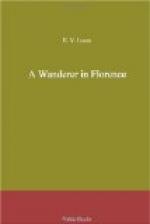Such was Landor’s impossible way on occasion that he succeeded in getting himself exiled from Tuscany; but the Grand Duke was called in as pacificator, and, though the order of expulsion was not rescinded, it was not carried out.
In 1835 Landor wrote some verses to his friend Ablett, who had lent him the money to buy the villa, professing himself wholly happy—
Thou knowest how, and why,
are dear to me
My citron groves of Fiesole,
My chirping Affrico, my beechwood
nook,
My Naiads, with feet only
in the brook,
Which runs away and giggles
in their faces;
Yet there they sit, nor sigh
for other places—
but later in the year came a serious break. Landor’s relations with Mrs. Landor, never of such a nature as to give any sense of security, had grown steadily worse as he became more explosive, and they now reached such a point that he flung out of the house one day and did not return for many years, completing the action by a poem in which he took a final (as he thought) farewell of Italy:—
I leave thee, beauteous Italy!
No more
From the high terraces, at
even-tide,
To look supine into thy depths
of sky,
The golden moon between the
cliff and me,
Or thy dark spires of fretted
cypresses
Bordering the channel of the
milky way.
Fiesole and Valdarno must
be dreams,
Hereafter, and my own lost
Affrico
Murmur to me but the poet’s
song.
Landor gave his son Arnold the villa, settling a sum on his wife for the other children’s maintenance, and himself returned to Bath, where he added to his friends Sir William Napier (who first found a resemblance to a lion in Landor’s features), John Forster, who afterwards wrote his life, and Charles Dickens, who named a child after him and touched off his merrier turbulent side most charmingly as Leonard Boythom in “Bleak House”. But his most constant companion was a Pomeranian dog; in dogs indeed he found comfort all his life, right to the end.
Landor’s love of his villa and estate finds expression again and again in his verse written at this time. The most charming of all these charming poems—the perfection of the light verse of a serious poet—is the letter from England to his youngest boy, speculating on his Italian pursuits. I begin at the passage describing the villa’s cat:—
Does
Cincirillo follow thee about,
Inverting one swart foot suspensively,
And wagging his dread jaw
at every chirp
Of bird above him on the olive-branch?
Frighten him then away! ’twas
he who slew
Our pigeons, our white pigeons
peacock-tailed,
That feared not you and me—alas,
nor him!
I flattened his striped sides
along my knee,
And reasoned with him on his
bloody mind,
Till he looked blandly, and
half-closed his eyes
To ponder on my lecture in
the shade.




